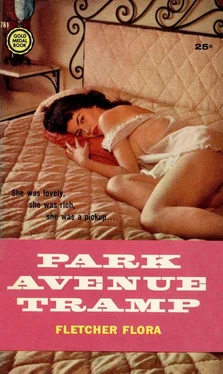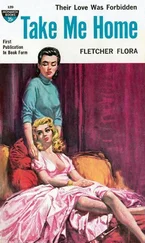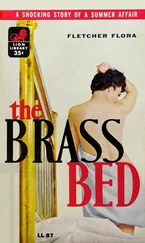“It has been established that I knew him, and it is perfectly clear that you know all about it. I don’t see why you keep going over and over it.”
“Sorry. If you will only be patient a little longer, I’ll appreciate it. Was this night at the Club about a week ago the first time you met Doyle?”
“Yes. I had been somewhere else and went in there to have a Martini and think about things. He was playing the piano, and someone else was playing a drum. It was quite clever, like a conversation that you kept trying to understand. Afterward, when it was quite late, Joe Doyle played requests on the piano, and I asked him to play a particular song. I thought he was very good, but he said that he wasn’t. We had Martinis together at the bar. At least, I had a Martini. He may have had something else.”
“I see. Did you leave the Club with him?”
“Yes.”
“Did you see him again after that night?”
“I don’t know that I should answer that. I can’t see that it makes any difference.”
“Perhaps you’re right.” Bunting looked miserable, and the lobe of his ear was red from the mauling of thumb and finger. “I hope you believe that I have no desire to embarrass you, and that I have no interest at all in your personal affairs. Let me come to the point directly. Do you have any idea who might have killed Doyle?”
She was silent, sitting with her hands folded and her bead bowed. She wondered if he would hear, as she did, from some remote and indeterminable source, the soft, incessant sound of cosmic weeping.
“No,” she said at last. “How could I?”
“I thought he might have mentioned someone who held a grudge against him. Something like that.”
“No. Nothing of the sort. He didn’t talk about other people he knew or what had happened to him before we became acquainted. As you see, I learned practically nothing about him.”
“Except that he had had rheumatic fever as a boy.”
“Yes, of course. He told me that. Also that he wanted to be an exceptional pianist, but didn’t have the ability. I thought that he was very sad about it, not having the ability and all, and I felt sorry for him and tried to make him feel that it was still possible, but he didn’t believe me.”
“I see. It’s tough, sometimes, learning to accept our limitations.” Bunting looked embarrassed again, as if he were suddenly aware that his remark sounded presumptuous. He had not looked at Oliver Farnese since his one previous glance, but at this moment he somehow gave the impression that he was deliberately, with an effort, refraining from looking. “There is one other point I’d like to mention, Mrs. Farnese, if you don’t mind.”
“Not at all. You may mention whatever points you choose.”
“Thank you. According to my information, you had arranged to see Joseph Doyle at the club where he worked on the night he was killed. Night before last, that was. Between six and seven o’clock, you called the Club and talked to the bartender and asked him to relay the message that you would be unable to come. Is that true?”
She would have lied about this if there had been any chance at all for a lie to be believed, but there wasn’t any, not the slightest, and so the only thing she could do was to tell the truth, or at least part of it, and try to make what had happened seem as natural and insignificant as possible.
“Yes,” she said, “it’s true. I called and said that I couldn’t come.”
“May I ask what made you change your plans?”
“Why do you continually ask if you may ask? Since you are obviously going to ask whatever you please, its rather ridiculous and a waste of time.”
“You needn’t answer any of my questions if you don’t want to. Not at this time, anyhow.”
“Later, however, you would force me to answer them. Is that what you mean?”
“I hope it would not be necessary.”
“In other words, if you were inclined to be honest, it is exactly what you mean. Well, it doesn’t matter, for I don’t mind answering at all, and I only wish you would not try to pretend that things are different from what they are.”
“I apologize. Please tell me why you were unable to go to the Club that night.”
“There was a very simple reason. I had promised I would go hear the piano and the drum again, because I liked them and wanted to, but at the last minute my husband wanted me to go out somewhere with him instead, and I felt compelled to go.”
Now Bunting did look sidewise at Oliver Farnese for verification, and Farnese smiled and nodded. It was apparent from his serenity that he found nothing disturbing in his wife’s activities and did not object in the least to her interest in pianos and drums and whoever played them.
“That’s right, Lieutenant,” he said. “We went to the Empire Room, where I had made a reservation. I suppose you can check that if you feel inclined.”
“I’m sure it won’t be necessary.” Bunting sighed and stood up. “I won’t intrude any longer, and I appreciate your kindness. These things are tough. The toughest. You find a body in a street or an alley, and there doesn’t seem to be any reason for it, no leads, no connections. We’ll be lucky if we ever get anything definite on this one. I mustn’t impose my troubles on you, however. I’ve already been bother enough, I’m afraid. Thank you again for your kindness, Mrs. Farnese. You’ve been very patient.”
“Not at all,” she said.
For a moment she was afraid that he was going to offer to shake hands on leaving, and she was exorbitantly relieved when he did not, turning abruptly, instead, and starting for the door with Oliver following. She remained motionless in her chair, her hands folded in her lap, and pretty soon Oliver returned from the door and stood a few feet away looking at her amicably.
“You did quite well, my dear,” he said. “I’m proud of you.”
“Are you?” she said.
“Yes, I am. You were admirable. I’ve never heard anyone avoid the truth so cleverly. You had poor Bunting on the defensive from the beginning.”
“I wasn’t trying to put him on the defensive. I only wanted him to get finished and go away.”
“I can understand that, my dear. You’ve gone through a difficult time. I was certain, however, that I could depend on you to be sensible. You’re feeling tired and despondent now, but you’ll recover in a little while. I’ve noticed before how remarkably durable and resilient you are.”
“Thank you very much.”
“You owe me no gratitude, my dear. You have earned everything I’ve said.”
“And done?”
“Yes. Said and done.”
He laughed and took half a step toward her, and she wondered what she would do if he were to touch her. Perhaps she would begin to scream, she thought, or rake him with her nails, or merely be sick on herself and the carpet. He did not touch her, however. He stood for a second with one foot before the other and one hand lifted toward her, but then he lowered the hand slowly and drew the forward foot back.
“I think you had better rest now,” he said. “If you don’t mind, I’ll go to the office for the rest of the afternoon.”
“I don’t mind. Please go where you wish.”
“Will you be all right?”
“Certainly.”
“It disturbs me to be off my routine. I want to resume it without any further delay, and I hope that it will not be necessary to disrupt it again soon.”
She didn’t know if this was a warning or not, but it was of no great importance. She sat without moving or answering, and he turned and went out of the room, and she continued to sit with her hands folded after he was gone, and she was still there, in the exact position she had been in when he left, when he returned and crossed the room and left the apartment.
Читать дальше












